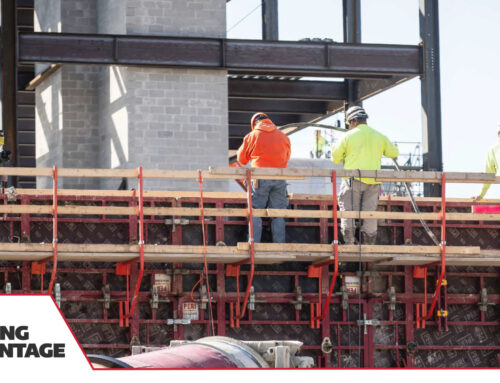In honor of National Apprenticeship Week, learn more about a Union ‘trades degree’
A traditional college degree isn’t the only path to a high-paying career. The Union building trades “earn while you learn” registered apprenticeship model offers competitive wages and benefits without the burden of college debt.
Union Apprenticeship = No Education-Related Debt
Individuals who enter a Union apprenticeship after high school get a head start on financial security. Industry investment in Union apprenticeship means individuals earn competitive wages while receiving classroom and on-the-job training. In traditional college settings, students are paying to be educated and often graduate with thousands of dollars of debt. Without college debt, tradespeople can afford to buy homes and cars well before their peers.
The most popular phrase of advice from local tradespeople is to “get started right away”. The earlier an individual enters the trades, the larger their pension will become. Many tradespeople can afford to retire in their fifties if they’ve started their career in the trades at an early age.
Opportunities for Advancement
Wisconsin’s construction industry includes a wide variety of Union trades from a carpenter to an electrician. Each trade has different apprenticeship requirements, job duties, and working conditions. After an apprentice completes their training and earns their journeyperson card, they can continue working as a craftsperson, or pursue roles in safety, estimating, training, or ownership.
Standardized Training Creates Value for All Stakeholders
The Union advantage is that our industry invests heavily in its people with several years of standardized training that is free to the apprentice. Every employer knows that they can expect professional and experienced Union workers.
In this industry, safety is our number one priority, and that’s shown through each of the trade’s training practices, and health and safety measures. Both apprentices and experienced workers get the same opportunity to learn new skills and stay updated on OSHA, ICRA, and other certifications. According to a study conducted by the Illinois Economic Policy Institute (ILEPI), signatory contractors are 34% safer than non-Union firms due to their investment in training.
A Worthwhile Investment for Employers
Turnover and retention are expensive. In the Union construction industry, 91% of apprentices who complete their apprenticeship are still employed by the same company nine months later. Union health, welfare, and pension funds administered by professional trust funds also add to employee satisfaction and retention, benefits that non-Union organizations don’t provide. Additionally, signatory contractors have proven to be 15% more productive than their non-Union counterparts because their Union craftspeople are highly trained.
Pathways toward Apprenticeship
It should be noted that trades apprenticeships aren’t just for 18-year-olds. Anyone looking for a stable career with excellent benefits can become a Union apprentice. Many individuals find their way to an apprenticeship after they’ve been in the workforce or attended college. For those who have been out of school for a while or who need a refresher, our workforce readiness partner, WRTP|BIG STEP, helps individuals prepare for apprenticeship testing and placement.
Certified pre-apprenticeship and youth apprenticeship are also gaining in popularity. Organizations and high schools partner with the industry to give students real-world experience in the trades.
Apprenticeship Keeps Milwaukee on a Path of Growth
Trades apprenticeships are local opportunities that pay premium wages which means our community reaps the benefits from a growing middle class. Construction in Milwaukee is proving to be steady with several huge projects currently being built and more in the pipeline. Skilled tradespeople are necessary to continue to build and grow our city. As many of our current tradespeople look toward retirement, the industry’s role is also to supplement these openings with interested apprentices. When we employ local tradespeople, we’re also supporting our communities.
The wages and benefits of careers in the union trades are still generally unknown to those not already in the fold. During National Apprenticeship Week, it’s important to promote the value of registered apprenticeship for individuals, the construction industry, and our community. College isn’t for everyone and it’s time union trades careers become an equal alternative.
Learn more about the benefits of Union registered apprenticeship on our website, buildingadvantage.org.





